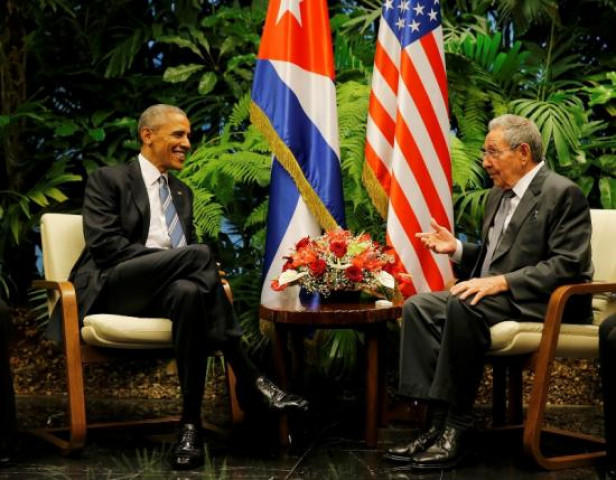Re-booting Cuba
The presidential visit to Cuba is the first in 88 years and, historic

US President Barack Obama and Cuba's President Raul Castro meet in Havana. PHOTO: REUTERS
The nitty-gritty issues — Guantanamo Bay, men and women held as political prisoners in Cuba (denied by the Cuban government) and the freedom of the media to criticise the regime without fear of arrest or worse — were all on the table. America has been long critical of the Cuban human rights record as has Cuba of the American failure to close Guantanamo — a signature goal of the first Obama term, it will be recalled. Cuba has also berated America for its own decidedly patchy civil rights record. Differences aside, none of which are capable of early resolution, the visit marks a sea-change in both American foreign policy and in Cuban engagement with the wider world — a world where communism has become a relic, a political has-been, and the number of communist countries continues to dwindle. China remains and will endure as a communist state, and Cuba seems no less durable for all its faults and inherent weaknesses. For America it is disentanglement from a Cold War anachronism and a chance to export American goods — and values — to a country hungry for one but perhaps not the other. President Obama spoke at the El Gran Teatro de Havana where Calvin Coolidge last spoke in 1928. His speech pulled no punches but was sufficiently conciliatory to be seen as feeding into his ‘peacemaker’ legacy, ending a timely and historic visit on a note of positivity.
Published in The Express Tribune, March 24th, 2016.
Like Opinion & Editorial on Facebook, follow @ETOpEd on Twitter to receive all updates on all our daily pieces.














COMMENTS
Comments are moderated and generally will be posted if they are on-topic and not abusive.
For more information, please see our Comments FAQ